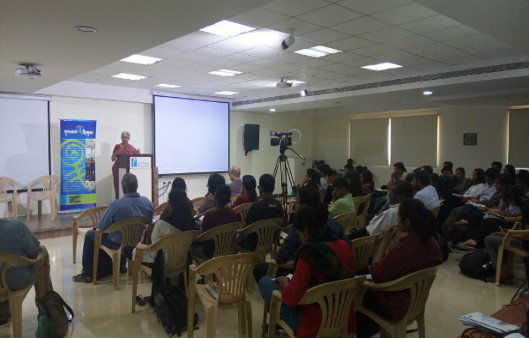IT for Change in collaboration with Azim Premji University and Friedrich Ebert Stiftung - India Office organised a course 'Re-conceptualising Women’s Rights and Gender Equality in a Plaformising Society' on 17th and 18th August 2018.
Essential background readings for the course
Avila, R. et. al. (2018). Artificial Intelligence: Open questions about gender inclusion. http://webfoundation.org/docs/2018/06/AI-Gender.pdf
Ganesh, M. (2018). Data and Discrimination: Fintech, Biometrics and Identity in India.
https://thesocietypages.org/cyborgology/2018/01/25/fintech-aadhaar-and-identity-in-india/
Gurumurthy, A. (2016). Beyond the online-offline binary: Why women need a new global social contract. https://www.genderit.org/feminist-talk/why-women-need-new-global-social-contract
Scassera, S (2018). E-commerce, future of labour and its impacts on women.
http://itforchange.net/draft/e-commercer-future-of-labor-and-gender-gap.pdf
Valente, M. and Neris, N. (2018). Are we going to feminise the Internet?
http://sur.conectas.org/en/are-we-going-to-feminise-the-internet/
Day 1
Panel discussion on 'Rethinking Tech-utopias: A Feminist Take on the Digital'
Panelists:Anita Gurumurthy, IT for Change
Nitya Vasudevan, Samvada
Shehla Rashid Shora, JNU
Gurumurthy, A. (2017). A history of feminist engagement with development and digital technologies.
https://www.apc.org/sites/default/files/HistoryOfFeministEngagementWithDevelopmentAndDigitalTechnologies.pdf
IT for Change (2018). National Dialogue on Gender-Based Cyber Violence – Event Report.https://itforchange.net/evaw/event-blog/
Patil, S.M. (2017). Debrahminizing online sphere: On larger questions of caste, gender and patriarchy. See https://www.genderit.org/articles/debrahmanizing-online-sphere-larger-questions-caste-gender-and-patriarchy
Day 2
Session 1. Gender Equality and Platform Society: Emerging Issues
Gurumurthy, A, Chami, N and Bilorou, C (2018). Gender equality in the digital economy: Emerging Issues. DRAFT PAPER http://itforchange.net/draft/Development-agenda-for-the-digital-economy-IT-for-Change-Draft-paper-August2018.pdf
Gurumurthy, A. and Chami, N. (2017). A feminist action framework on development and digital
technologies. https://www.apc.org/sites/default/files/FeministActionFrameworkOnDevelopmentAndDigitalTechnologies.pdf
United Nations Human Rights Council (2017). Promotion, protection and enjoyment of human rights on the Internet: ways to bridge the gender digital divide from a human rights perspective.
https://documents-dds-ny.un.org/doc/UNDOC/GEN/G17/111/81/PDF/G1711181.pdf?OpenElement
Session 2. How Techno-Structures Work – Algorithms and AI as Frontier Gender Issues
Dickson, B. (2018). Artificial Intelligence has a bias problem and it is our fault.
https://in.pcmag.com/netflix/123462/feature/artificial-intelligence-has-a-bias-problem-and-its-our-
fault
Gurumurthy, A. And Chami, N. (2016). Data: The new four letter word for feminism.
https://www.genderit.org/articles/data-new-four-letter-word-feminism
Lokanathan, S. (2014). Some reflections on the analytical challenges in big data.
https://www.unglobalpulse.org/analytical-challenges-big-data
Taylor, L. (2013). The scramble for Africa’s data – Resource grab or development opportunity.
https://linnettaylor.wordpress.com/2013/06/27/the-scramble-for-africas-data-resource-grab-ordevelopmentopportunity/
If you want the tech terms demystified, see:
Caplan, R. And Donovan, J. (2018) Algorithmic Accountability: A Primer prepared for the
Congressional Progressive Caucus. https://datasociety.net/wpcontent/uploads/2018/04/Data_Society_Algorithmic_Accountability_Primer_FINAL-4.pdf
If you are already familiar with the field of algorithmic tech and AI and are looking for a deepdive, see:
Bolukbasi, et. al. (2016). Man is to Computer Programmer as Woman is to Homemaker? De-biasing
Word Embeddings. https://arxiv.org/abs/1607.06520
Session 3. Gender Considerations in Policy and Techno-design Architectures - Case Studies in
Groups
**************************************************************************************************************************
Course organized by IT for Change and Azim Premji University during February 2017
IT for Change and Azim Premji University (APU) organised a course titled 'The Gendered Digital in the Network Society', between 3rd and 4th February 2017, which was supported by the Genderlogues program of the India office of Friedrich-Ebert-Stiftung (FES).
Through a series of panels, lectures and activity based discussions, the course introduced participants to feminist perspectives on emerging debates at the intersections of digital technologies and development.
Day 1
Panel Discussion on ‘A feminist lens on a Digital India’ Bishakha Datta, Point of View Usha Ramanathan, Legal Scholar Anita Gurumurthy, IT for Change
Read blog on panel discussion here.
Day 2
Session 1. Presentation on political feminism in India: an analysis of actors, debates and strategies Damyanty Sridharan, FES, India Office
Session 2. Lecture on Gender, digital technologies and transformative change Anita Gurumurthy, IT for Change
Session 3. A panel discussion on rethinking women’s rights in the digital age Patrick Ruether, FES, India Office Amrita Vasudevan, IT for Change Nandini Chami, IT for Change
Session 4. Unpacking gendered narratives of the digital: A case study exercise in groups
Session 5. Building blocks for a feminist manifesto of the digital: Group exercise
Read a report of the workshop here
Course Resources:
Case studies for group exercise on Unpacking gendered narratives of the digital

